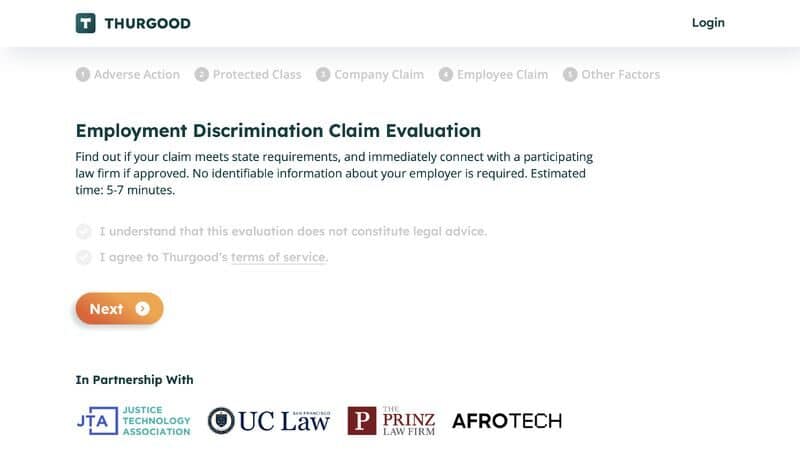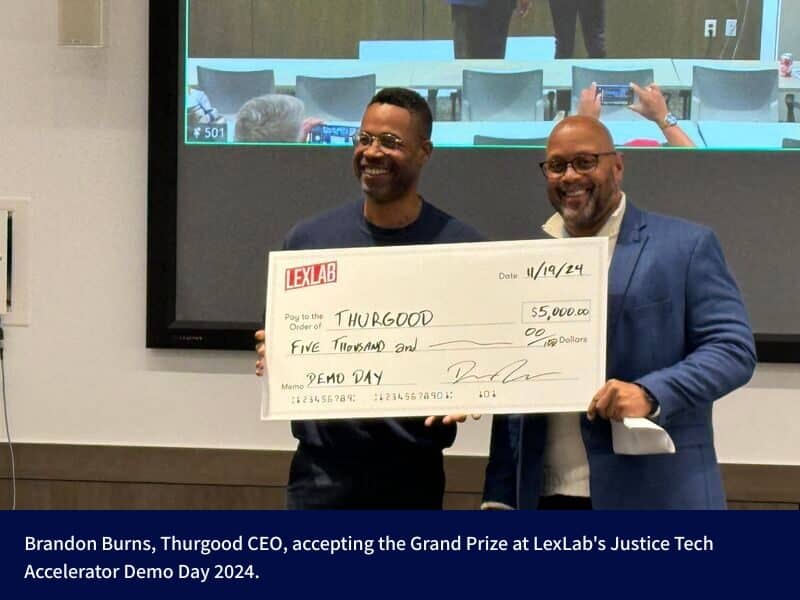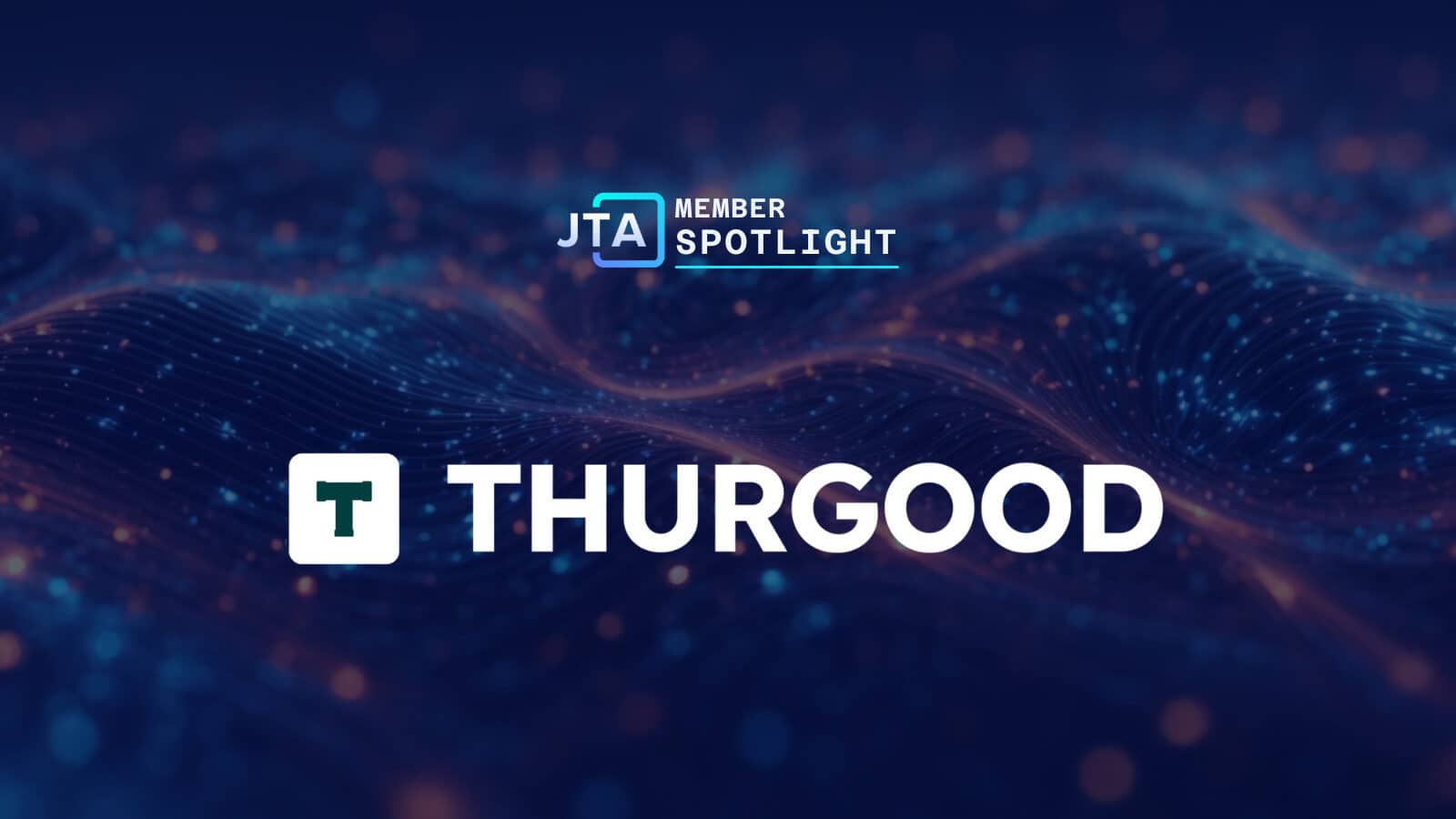Getting justice after facing discrimination at work shouldn’t depend on whether you can afford a lawyer or understand the legal system. But for too many people, especially low-income workers and people of color, that’s the reality. Thurgood is working to change that by using technology to make it easier – and faster – to get legal support when you need it most.
Brandon Burns founded Thurgood to bridge the gap between everyday people and the justice system. With a background that spans law, skilled trades, and product design, Brandon is building a tool that helps victims of workplace discrimination understand their rights and take action. In this spotlight, he shares more about what inspired Thurgood, the progress they’ve made, and where they’re headed next.
1. What is your company’s mission?
At Thurgood, we’re on a mission to make the law work for everyone, especially for people who have been victims of discrimination in the workplace. We use AI to help individuals understand whether they have a legal claim and what they can do about it. Our goal is to reduce the time, cost, and confusion involved in getting legal support, and to help people feel empowered – not powerless – in the face of injustice.
2. What inspired you to start your company?
I actually started in law school, but I left to pursue a career in the skilled trades. That experience gave me a new perspective on access to justice. I met so many hardworking people who had clearly been treated unfairly but didn’t have the time, money, or knowledge to fight back. That stuck with me. I wanted to create something that could meet people where they are – something simple, clear, and effective. Thurgood is a response to that need.
3. What problem are you solving?
Legal services are often out of reach for people who need them most. Filing a discrimination claim is complex and time-consuming, and it can be hard to even know if you have a case. We’re solving that by offering a fast, AI-driven way to evaluate whether someone has a potential claim and guiding them on what to do next. It’s about reducing friction in the process and helping people take action with confidence.
4. Who are your customers?
We serve individuals who believe they’ve been discriminated against at work, whether that’s based on race, gender, disability, or other protected characteristics. We also work with law firms that are looking for more efficient ways to evaluate claims. Our platform helps firms screen leads and helps individuals get clarity on their options. It’s a win-win.

5. What is your business model?
Thurgood is a privately held company. We offer our services directly to consumers, individuals who need help evaluating a claim, and we also partner with law firms to provide claim screening tools. For individuals, we aim to keep our pricing simple and affordable. For firms, we help improve intake and save time. Our approach is about creating value on both sides of the justice equation.
6. What is your company’s most significant achievement to date?
In 2024, we won the Grand Prize at LexLab’s Justice Tech Demo Day at UC Law, San Francisco. That was a huge moment for us – not just because of the recognition, but because it showed that people understand and believe in what we’re building. It gave us validation that the justice tech community sees this problem as urgent and sees our approach as part of the solution.
7. What are your goals for the next year?
Our biggest goal is to continue growing the impact of our AI. We want to improve its accuracy, expand the types of discrimination it can evaluate, and build out new features to help people take the next steps after they’ve been screened. We also want to scale our partnerships with firms and community organizations, so we can reach more people, faster. We believe we can significantly reduce the time it takes to get legal support and increase the number of people who actually move forward with claims.
8. What is your biggest challenge?
Keeping up with changes in employment law is a big challenge, and making sure our AI reflects those changes accurately and fairly. We’re tackling that by working closely with legal experts, updating our models regularly, and stress-testing the platform with a wide range of scenarios. It’s a moving target, but we take that responsibility seriously.
9. What does “justice tech” mean to you?
To me, justice tech means using the tools of today – AI, data, automation – to solve the systemic problems of yesterday. It’s not just about digitizing legal services; it’s about rethinking the system so that people without privilege or power can still access justice. It’s about fairness, speed, and dignity.
10. Why did you join JTA, and what do you love about being part of it?
I joined JTA because I wanted to be in community with others who are thinking deeply and creatively about access to justice. It’s been great to connect with founders and organizations who are tackling different parts of the same problem. It feels less like a competitive space and more like a movement. The collaboration and shared learning have been invaluable.
11. Share another organization you love that is working to bridge the Access to Justice Gap, and why.
One organization I really admire is fellow JTA Member Your Case Plan – they are doing important work in the family law space, helping parents navigate the complexities of custody planning with clarity and support. They are a great example of justice tech rooted in real-life needs.

12. How can people learn more about your company?
You can learn more by visiting www.askthurgood.com. Whether you’re someone facing workplace discrimination or a law firm looking to improve your intake process, we’d love to connect.
Thurgood is helping to close the justice gap by making it easier for people to understand their rights and take action after facing discrimination at work. Their AI-powered approach offers a new path forward for those who might otherwise be left out of the legal system. Thurgood’s commitment to bridging the justice gap aligns with the values of the Justice Technology Association.
🔗 Learn more at www.askthurgood.com
🔗 Connect with Brandon Burns on LinkedIn


